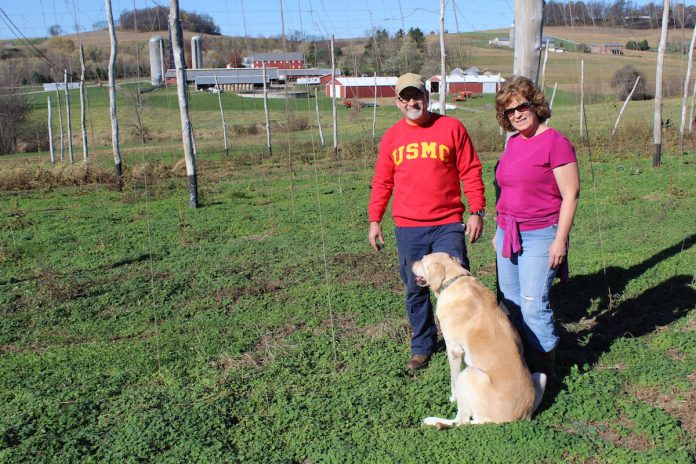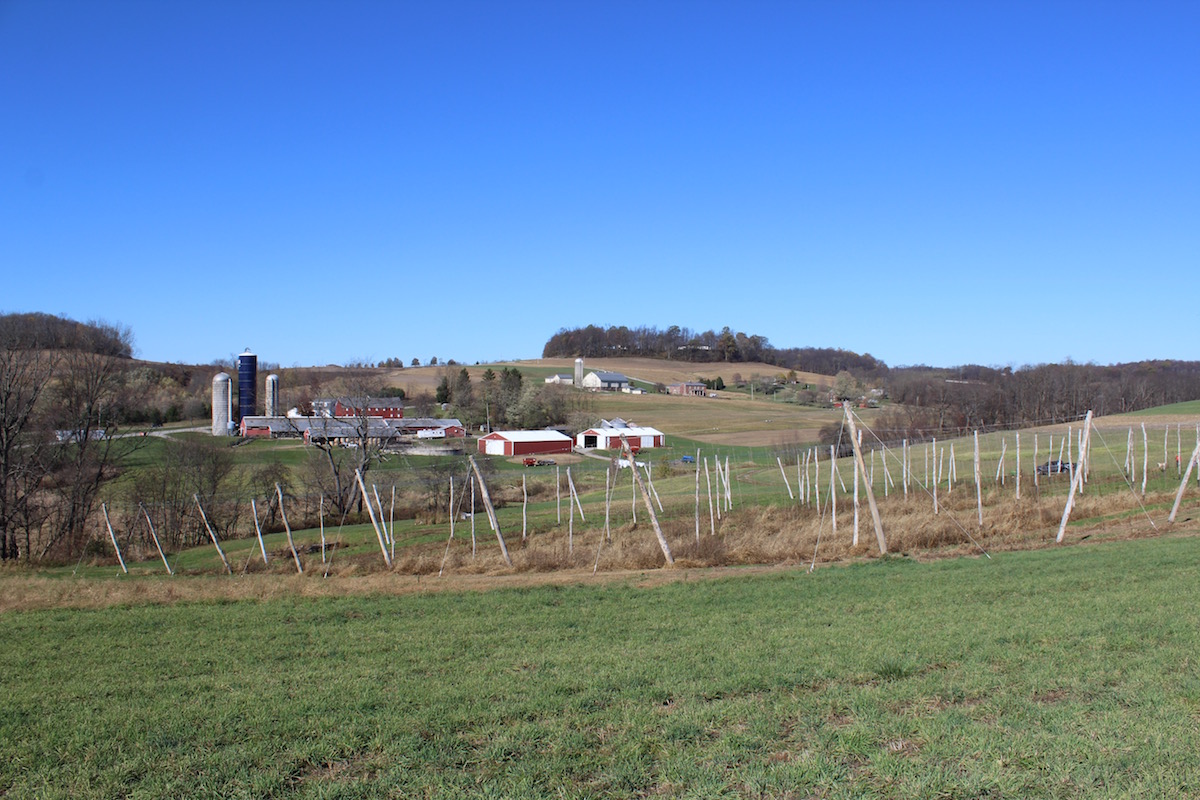
LATROBE, Pa. — Devin Winklosky was sort of the black sheep of his family. Instead of becoming a farmer, like his three older siblings did, he became a U.S. Marine.
And, then, a lawyer. Instead of putting down deep roots in the Westmoreland County countryside, like his family did, he traveled all over the country and the world for his job in the military for 20 years, before retiring.
He moved back to the area in 2014. Farming is what brought him back close to his family.
True to form, his pathway into farming is a little unconventional.
“I had this crazy idea that hops might be fun to grow,” he said.
Winklosky started a hop farm in partnership with his sister and brother-in-law, Mary and Sam Stoner, outside Latrobe, Pennsylvania. It’s called Teufel Hunden Hops Company. Teufel Hunden translates roughly to “devil dogs” in German. The story has it that’s what the Germans called the Marines they fought during World War I. The Marines took the nickname on with pride.
A world away
Winklosky grew up on the family farm, in Derry, Pennsylvania. It was your typical diversified farm, with a little bit of everything going on. Beef, sheep, pigs, grain, hay.
Paul, the oldest, bought their parents’ farm and continues to grow row crops and raise pigs. His sister, Amy, the second oldest, went on to run an organic dairy farm with her husband and children. His sister, Mary, the third in line, also went into dairy farming with her husband.
Then, there was Devin, who went into the U.S. Naval Academy after high school and then into the Marine Corps. He figured he’d put in his time, serve his country and move on. He did four years in an infantry unit — 2nd Battalion 5th Marines — based out of Camp Pendleton, in California. He deployed with the 31st Marine Expeditionary Unit.
During that time, at the urging of a judge advocate who saw his potential, he applied for and got into a program that sends Marines to law school. He got his law degree from the University of Pittsburgh
He never expected to get into the military, become a lawyer and make a career of it.
“It turns out I had a natural inclination toward what lawyers do,” he said. That means talking to people, finding the facts, assessing the situation and solving problems.
He went to the University of Pittsburgh. Over his career as a judge advocate, which is what an attorney in the Marines is called, he worked as a prosecutor, defense counsel and as a judge, among other jobs. He was stationed in Okinawa, Japan, North Carolina and Virginia, and also deployed twice in support of Operation Iraqi Freedom.

Big ideas
The idea for a hop farm came to Winklosky when he came across some old photos of hop farms from a trip his parents took to Bavaria. After Winklosky and his wife took a trip to Germany and saw the beauty of the Bavarian hop yards, he had his mind made up.
“We can do it,” he said. “Maybe this is a niche we can get into.”
He assessed the need for local hops in the area. Most hops grown in the U.S. are supplied to brewers by three states: Washington, Oregon and Idaho. Winklosky talked to craft breweries in Westmoreland County about their interest in using locally grown hops. Turns out, a lot of them were interested but had no steady supply.
He pitched the idea of a hop farm to his family. Mary said she laughed at first.
“Then, I thought, that sounds great,” she said. “We needed to diversify anyhow.”
Branching out
The Stoners sold their dairy cows eight years ago. They were milking about 100 cows and farming about 600 acres in corn and soybeans. After the milk cows left, they started feeding out some beef cattle and still grow corn and soybeans.
The 2-acre hopyard is on the grounds of former pasture for the dairy cattle. Construction began in February and they put in 1,500 plants. They’re growing seven varieties. Hops take three years to mature and give a full yield of cones, so this year was about practice and getting ready for more substantial growth and harvest next year.
It wasn’t as simple or easy as Winklosky initially expected, but they’re figuring it out and fine tuning things as they go.
“We hope to come into 2021 strong,” he said.
They bought a hop harvesting machine to pull the cones off the bines. Winklosky said he built a hops dryer in his garage. They hope to get a pelletizer in the coming year to process the harvested cones into a storable product breweries can use year round.
Winklosky gives a lot of credit to his brother-in-law, Sam, for helping him make this dream a reality. His knowledge of the land and experience in farming was invaluable in bringing the hopyard to life.
The whole thing has brought Winklosky closer to his family and to home. In his past life in the military, he’d be stationed halfway across the world and hear how his family was about to take in hay or harvest corn. He wished he could be there. Now, he is.
(Reporter Rachel Wagoner can be contacted at 800-837-3419 or rachel@farmanddairy.com.)










